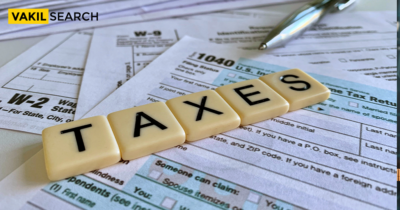Explore the implications of failing to pay professional tax, a direct tax levied on individuals earning a livelihood through employment, practicing a profession, or engaging in business. Uncover the potential consequences that may arise if professional tax obligations are neglected by delving into this insightful blog.
Introduction
Professional tax (Ptax) is a direct tax levied on individuals who earn a livelihood through employment, practicing a profession, or engaging in business. This tax is crucial for various professions, including doctors, teachers, lawyers, chartered accountants, and more. The collection of Ptax is facilitated by employers who deduct it from employees’ salaries and remit it to state governments. For those not receiving a regular salary, professionals are obligated to pay this tax directly to the government. This article delves into the intricacies of professional tax, its calculation, registration, applicable slabs, exemptions, and the repercussions of non-compliance.
Professional Tax Registration
All employers are mandated to register for Ptax within 30 days of hiring new employees. Similarly, professionals in various fields must register within 30 days of commencing their practice.
Note – The registration process may vary across states, and for businesses with multiple locations, compliance with individual state laws is necessary.
Calculating a Professional Tax
The calculation and payment of Ptax are state-specific, with methods ranging from online to offline payments. State governments determine the frequency and format of Ptax return filings. Article 276 of the Constitution grants state governments the authority to impose professional taxes, usually capped at Rs 2,500.
Exemptions from Professional Tax
The following individuals are exempted from paying Ptax under the income tax returns –
- Parents or guardians of kids who have a permanent or mental impairment
- A person who has a permanent physical handicap, such as blindness
- Any individual older than 65 years
- Members of the armed services, including auxiliary forces or reservists, serving in the state, as specified by the Air Force Act of 1950, the Army Act of 1950, and the Navy Act of 1957
- Women only hired as agents under the Mahila Pradhan Kshetriya Bachat Yojana Temporary workers working in the textile sector
States and Union Territories without Professional Tax
Following are some of the Indian states and union territories where no Ptax is applicable:
- Arunachal Pradesh
- Himachal Pradesh
- Delhi
- Haryana
- Uttar Pradesh
- Uttarakhand
- Andaman and Nicobar Islands
- Daman & Diu
- Dadra and Nagar Haveli
- Lakshadweep
- Jammu & Kashmir
- Punjab
- Rajasthan
- Chandigarh
- Goa
Professional Tax Slabs
The professional tax slabs vary among states, and it is currently applicable in several states in India. The tax rates are determined based on gross monthly salary. The article includes a detailed chart showcasing the highest Ptax slab rates in various states.
The chart below exhibits the highest professional tax slab rates in various states of India.
| State | Gross Monthly Salary | Tax Per Month |
| Gujarat | ₹12,000 and above | ₹200 |
| Maharashtra | ₹10,000 and above | ₹200 (300 for February) |
| Odisha | ₹20,000 and above | ₹200 |
| Chhattisgarh | ₹25,000 and above | ₹200 |
| Madhya Pradesh | ₹15,000 and above | ₹212 |
| Bihar | ₹83,000 and above | ₹208 |
| Karnataka | ₹15,000 and above | ₹200 |
| Telangana | ₹20,000 and above | ₹200 |
| Tamil Nadu | ₹12,500 and above | ₹182 |
| Andhra Pradesh | ₹20,000 and above | ₹200 |
| West Bengal | ₹40,000 and above | ₹200 |
| Assam | ₹25,000 and above | ₹208 (212 for February) |
| Sikkim | ₹40,000 and above | ₹200 |
| Meghalaya | ₹41,667 and above | ₹208 (212 for February) |
| Tripura | ₹15,000 and above | ₹208 (212 for February) |
| Kerala | ₹20,834 and above | ₹208 |
Consequences of Non-Compliance
Failure to comply with professional tax registration regulations can result in penalties, fines, and interest charges. The penalties vary based on the specific regulations of each state. Late registration, delayed tax payments, or failure to file returns on time may lead to fines, late fees, or interest. The consequences may include interest charges ranging from 1% to 2% per month, penalties ranging from 10% to 50% of the total amount owed, and additional taxes if false information is provided.
Conclusion
Navigating the landscape of Ptax is essential for individuals and businesses alike. Compliance with registration procedures, understanding tax slabs, and staying informed about exemptions are crucial aspects. Non-compliance can lead to severe consequences, including financial penalties and interest charges. Seeking professional advice and ensuring timely payments can help individuals and businesses avoid legal complications. For comprehensive assistance with professional tax matters, consulting with experts or utilizing services like Vakilsearch is advisable. Clarity on registration procedures and proactive tax estimation can contribute to a smooth and hassle-free transaction. Reach out to us today!
Frequently Asked Questions
What happens if professional tax is not paid?
Failing to pay professional tax can lead to penalties and interest charges. Depending on the state, these can include late payment fees, monthly interest accrual, and even higher penalties for deliberate non-payment. In some cases, it might also hinder your ability to obtain certain government services or documents. It's best to settle your dues promptly to avoid these consequences.
What is the penalty for filing professional tax late?
Employers and individuals who neglect to fulfill their professional tax responsibilities will incur a monthly penalty of 2%.
Can we get professional tax back?
Individuals whose income surpasses the basic exemption threshold and who have paid income tax are eligible to claim a deduction for professional tax paid and receive a refund under section 16(iii) of the Income-tax Act, 1961.
What is the interest on delayed payment of professional tax?
Late payment of professional tax incurs a penalty of 1.25% per month for individuals who are registered but fail to remit the tax promptly.
How is late payment penalty calculated?
To calculate the interest owed on a late payment, multiply the debt amount by the days the payment is overdue, and then by the daily late payment interest rate effective on the date the payment became late.
Is interest on late payment of PT allowed or disallowed?
Interest accrued on delayed payment of Professional Tax, considered compensatory, is allowable.
Is professional tax allowed or disallowed?
The Income Tax Act of 1961's Section 16(iii) permits an employee to deduct the profession tax they have paid from their gross compensation.
Which section deals with interest on delayed payment?
Section 234A of the Indian Income Tax Act concerns the interest obligations imposed on taxpayers for late submission of income tax returns. It chiefly addresses the accrual of interest on unpaid or delayed tax amounts beyond the stipulated filing deadline.










